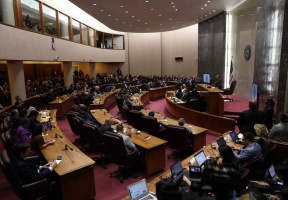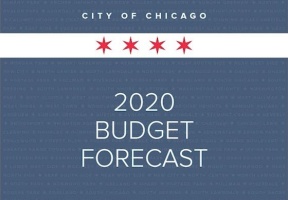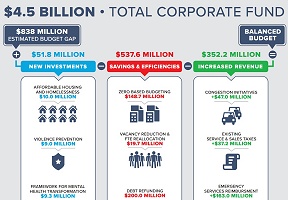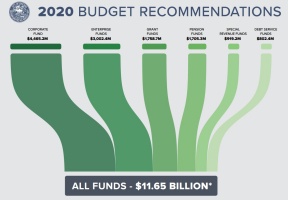

By: Ashmar Mandou
Mayor Lori E. Lightfoot presented to City Council the 2020 budget proposal that promises to bring forth a progressive, responsible budget that maximizes government efficiency, prioritizes structural reforms, and makes critical investments in people and communities most in need. After hearing from community members, this reforms-based budget attempts to address an $838 million deficit with structural measures accounting for 60 percent of the historic gap, and assumes new revenues from progressive, instead of regressive policies. Importantly, it represents the City’s shared values and lays the groundwork for a path to long-term fiscal sustainability.
“When I became mayor, our City was staring down a nearly $1 billion shortfall, including the largest one-year pension payment increase in our history. After hearing from thousands of residents, meeting with elected officials and community groups and listening to business leaders and other key stakeholders, I’m proud to present a budget that prioritizes good governance, strong fiscal stewardship and progressive investments to support our residents and build stronger communities,” said Mayor Lori E. Lightfoot.
The 2020 budget process began with a first-ever prime time State of the City address, where the Mayor provided residents an overview of the City’s fiscal conditions and presented the 2020 Budget Forecast, a historical picture of the City’s finances, current costs, and future liabilities. This inclusive budget process continued with an online budget survey that gathered input from over 7,300 participants who expressed their views on City spending and investment priorities. To listen to residents in every part of the City, Mayor Lightfoot held five budget town-hall meetings, including one specially for young people to hear directly from those who will be impacted about how they wanted their tax dollars spent. The fiscal year 2020 budget prioritizes historically disinvested communities, with nearly $52 million in key investments, including increased funding to address affordable housing and reduce homelessness, and mental health support for the city’s most vulnerable residents.
To strengthen public safety, the proposed budget will include millions of dollars to invest in a community-based violence prevention strategy focused on the 15 communities with the highest levels of violence. Additionally, the budget includes additional resources for resident engagement to ensure every Chicagoan is counted through the 2020 census and through the replacement of a 15-year old balloting system to ensure continued accurate and full electoral representation. The proposed budget identifies several reforms to government operations, achieves savings and eliminates waste. Nearly $537.6 million in savings, efficiencies, and reforms have been identified by eliminating vacancies, consolidating departments and City functions to better streamline internal processes, and refocusing on delivery of core departmental services to support communities in the most effective way possible. These include more than $148.7 million from zero based budgeting, and another $19.7 million in vacancy reduction and full-time equivalent reallocation.












